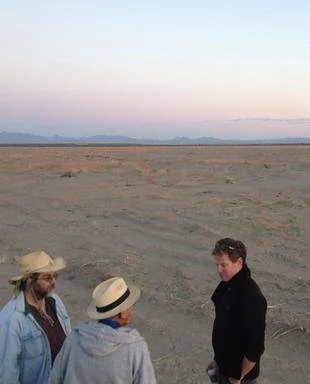Robert Lundahl (RT) with journalist, Chris Clarke and Alfredo Figueroa (Yaqui/Chemehuevi) at the site of Blythe Solar development outside Blythe, CA.
See 10/08/2025 cineSOURCE article:
The Modern Films, Ancient Environs & Different Peoples of Robert Lundahl.
“Art is a form of expression, reflecting the world around us through mediums like painting, literature, music, and film. Oscar Wilde’s quote, ‘It is the spectator, and not life, that art really mirrors,’ changes the perspective on the nature of art. It suggests that art is not just a similacrum of reality, but a projection of the maker’s own experiences, emotions, and interpretations.”
Born in Pasadena, California, Robert Lundahl received his B.F.A. from the University of Oregon, and studied at the University of Southern California (Cinema Studies). As a student, Lundahl produced a short documentary titled “The Burden of Proof,” on the use of Agent Orange in National Forests.
The film was screened for a U.S. Senate subcommittee on the environment. Lundahl developed his skills as a location cinematographer during three years shooting nationally syndicated sports and entertainment programs for John Fabian Productions. He also produced more than 100 public relations, consumer marketing and training programs and campaigns, and created several high-end films for the investor community.
In 1990, he formed Robert Lundahl and Associates LLC, a San Francisco company creating innovative communications products and strategies. Beginning in 1999, Lundahl moved to series production with” Digital Journey,” an award-winning series of 39 short (3:30) programs exploring the human side of technology – its cultural, environmental, and social contexts. The series was filmed around the globe for broadcast on U.S. public television and Canada’s TVO. Lundahl also directed and photographed key episodes including an Emmy Award-winning trilogy on E-Commerce in China.
Lundahl also develops independent programming for television. Filmed in Washington State, “Unconquering the Last Frontier,” explores the causes and effects of the ongoing salmon crisis in the Pacific Northwest, focusing on the Elwha River. The film was released to broadcast in 2005 and has been honored by film festivals around the world. The film tells the story of the Lower Elwha Klallam tribe’s struggle to survive in the shadow of hydropower development.
Lundahl’s documentary, “Song on the Water” (2005), takes viewers along with 50 indigenous canoes, their crews, and communities on a modern-day voyage to a traditional potlatch. Filled with beautiful photography and inspiring Coast Salish songs and cultural expressions, the one-hour film explores what the voyage means to the “pullers,” ground crews, and elders who share the waves, the traditions, and a vision of a positive future for Coast Salish youth. The film has been aired on public television stations across the U.S.
“PayDirt,” an investigative documentary on housing development on polluted brown-fields sites and military bases (2009/2010), created with partners Homeowners of Texas, salem-news.com, Clean Water Now!, GreenAction, Californians for Renewable Energy, The Law Offices of Joe and Angela Alioto, The San Francisco Bay Guardian, and others, was produced for FDI in 2010. Robert has recently concluded production on “Who Are My People” (2017) a film about what we know and do not know about the desert.
Lundahl’s work has earned numerous awards, including the Emmy, the International Television Association’s “Golden Vision” Award, the U.S. International Film and Video Festival’s “Silver Screen,” I.A.A.V.C.’s “Cindy,” and the “Telly” Award. His productions have been screened at festivals including the EarthVision International Environmental Video Festival (First Place), the Columbus International Film & Video Festival (Honorable Mention), the International Wildlife Film Festival (Finalist), the American Anthropological Association Film & Video Festival, Hazel Wolf Environmental Film Festival, REAL2REEL Documentary Film Festival, El Festival del Riu (Spain), Great Lakes Independent Film Festival, Moab Film Festival, Anchorage Film Festival.
Robert is a contributing member of the WSU, Washington State University, Thin Green Line is People’s History Speakers’ Bureau.
Interview with Robert Lundahl by former Clinton White House writer, Lura Lee, “Hippies Turned Yuppies Turned Billionaires.” 4K Ultra High Definition 3840 x 2160. “Who Are My People” Film.
